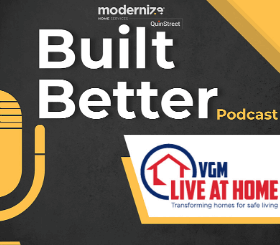Communication with potential clients is more than the words you speak or the numbers in a project estimate. Homeowners often make buying decisions based on their emotions. It is important to evaluate the messages you are conveying during each interaction. When you exude confidence, it helps better position your experience, knowledge, and quality workmanship skills.
Building Confidence Helps Close the Sale
As a contractor, when you display confidence throughout every customer interaction, you naturally create an environment where the homeowner will also feel confident about moving forward with the project.
It is common for homeowners to have multiple questions about their project. Many large scale home improvement projects —like a roof or window replacement— may only happen once or twice in their lifetime.. Homeowners are often unsure about the costs of construction, the timeline for completion, the best materials to use, and other project details.
Answering all of a homeowner’s questions, confidently, provides the reassurance people need. It helps assure them that they are making good decisions each step of the project. Pushing forward without these reassurances, and not being transparent with your answers, can deter a homeowner from pursuing their project. It is critical that you take time to share insights, guidance, and support through all stages of the project process.
Asking Questions to Instill Confidence
If you want to build confidence for the homeowners you are working with, then you need to learn more about their biggest concerns. Asking intuitive questions can be a powerful way to not only show your concern, but also demonstrate that you understand homeowners’ challenges. Be purposeful in your questions, with the intention of learning more about the customer’s preferences. Learn:
- What is the customer’s goal for the project?
- How does the customer envision the end result of the renovations?
- Why is the person hesitant to start construction?
- Is there a target date for completion?
- Are there any customer objections to the services you are offering?
- How much does the customer want to spend on the project?
A clear conversation about possibilities and potential issues shows each customer that you are actively engaged in creating an optimal outcome. When you are sincere in asking the right questions and helping homeowners find solutions, it builds a foundation of trust and confidence as you move forward with the work.
Ready to grow your business?
Body Language and Tone Counts / Presentation is Everything
According to a study sourced in the Harvard Business Review, people create impressions about a leader’s competence in as little as half a minute. The article states, “Within seconds, listeners will decide whether you are trustworthy, and they will do it based on your body language and vocal attributes.”
How you speak —and even sit— will immediately impact a homeowner’s perception of you. It is important to present confidently as soon as you arrive. Whether you are meeting with a homeowner in person or virtually there are habits to adopt that make you exude certainty about your craft.
Body Language:
- Make eye contact. Eye contact is key for building trust between parties— whether you are virtual or in person. If this feels difficult or unnatural at first, don’t worry. Eye contact is important throughout your meeting, but notably during your presentation. Practicing and even recording yourself will help you become more familiar with your pitch— and allow you to have natural eye contact instead of reading from a screen.
- Gesture when speaking. Using your arms and body to emphasize points in your presentation will also convey confidence. One study examined the body language of 10 TED speakers —including Jeff Bezos, Tony Robbins, and Brene Brown— found positive, nonverbal cues include gesturing, leaning in toward your audience, and touching your heart to convey deeper emotion when speaking.
- Sit still and tall. Keep your head up and your shoulders back during your meeting— in person or online. Avoid slouching or shaking your hands/legs during a meeting. Fidgeting reads as nervousness and can make you appear less confident. To make yourself feel more comfortable, take deep breaths to shake that fight-or-flight feeling.
Tone and Word Choice:
- Avoid saying um, like, and ya know? These words, which often occur when we are nervous, make a speaker sound unsure and unknowledgeable. The Harvard Business Journal writes, “Most people use filler words because they’re afraid of silence. It takes confidence to use dramatic pauses.” As we mentioned above, practicing and recording yourself can help you become cognizant of these behaviors and help you break these habits.
- Speak clearly. Using a clear voice can also help you appear confident. Be careful not to speak too softly (or too loud) in a meeting with a homeowner. If you speak clearly and comfortably, you will put the homeowner at ease.
Show Proof of Your Work
While the price is important when choosing a contractor, 26 percent of homeowners view expertise as a critical factor in their decision. If you can share this confident expertise with a homeowner they will likely select you as their ideal contractor even if your price is higher than the competition.
While words and body language play an important role, so do tangible examples of your work. Be sure to share personal references, before and after photos, and testimonials from past customers.
Confidence Builds Your Business
Prioritizing your customer relationships will help your business thrive.. Applying these confidence strategies sets the foundation for providing great customer satisfaction, which leads to ongoing sales and referrals in the future.

















